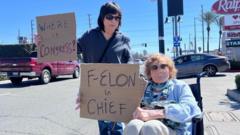In the wake of Elon Musk’s political involvement, protests and vandalism have surged against Tesla facilities across the United States. Dubbed the "Tesla Takedown" movement, these demonstrations have seen both peaceful rallies and incidents of violence, including fires set at showrooms and charging stations in Colorado and Massachusetts.
The weekend witnessed significant unrest in New York City as hundreds occupied a Tesla showroom, resulting in several arrests. Vandalism has also targeted the Cybertruck, with some owners purposefully defacing their own vehicles to express dissent against Musk, who has been increasingly criticized for his political maneuvers since his advisory role in the Trump administration.
Protesters in Burbank, California, showcased their feelings outwardly; one brought her white Model X, adorned with expletives aimed at Musk. Others expressed their concerns through slogans like "Deport Elon" and "Boycott Swasticar," associating Tesla with harmful political ideologies. Many former supporters expressed remorse over their Tesla purchases due to Musk's controversial actions.
Karen Rabwin, speaking at a protest, revealed her resignation from the brand after trading in her Tesla for a Cadillac. She explained her reasoning, citing a need for alignment with her values: “It was embarrassing. It wasn’t what I stood for.” Celebrities like singer Sheryl Crow have also distanced themselves from Tesla, donating their vehicles and publicly condemning Musk's involvement in politics.
Amid the escalating criticism, Musk responded to the protests via X, the platform he owns, by highlighting the positive experiences of Tesla customers. He thanked supporters for their continued patronage, despite the protests’ increasing volume. However, footage on social media shows a disturbing trend of Cybertrucks being vandalized—used as makeshift skate ramps or strewn with trash—indicating a growing a tension with the public.
The protests have not only drawn attention to Musk's political role but also raised questions about the influence he wields over the US economy. Critics argue that Musk’s close ties with the government, especially regarding contracts related to NASA and the Defense Department, pose ethical dilemmas. There are claims that he has sought to redirect federal contracts, which further fuels the outcry against him.
As the demonstrations continue, the negative impacts on Tesla’s stock are becoming apparent, with the value slipping back to pre-election levels as sentiment turns sour amongst previously loyal customers. Many Americans are urging lawmakers to reconsider Musk’s influence in the financial landscape, demonstrating that the "Tesla Takedown" protests signify more than just discontent—they represent a rallying cry for economic justice and political accountability.
The weekend witnessed significant unrest in New York City as hundreds occupied a Tesla showroom, resulting in several arrests. Vandalism has also targeted the Cybertruck, with some owners purposefully defacing their own vehicles to express dissent against Musk, who has been increasingly criticized for his political maneuvers since his advisory role in the Trump administration.
Protesters in Burbank, California, showcased their feelings outwardly; one brought her white Model X, adorned with expletives aimed at Musk. Others expressed their concerns through slogans like "Deport Elon" and "Boycott Swasticar," associating Tesla with harmful political ideologies. Many former supporters expressed remorse over their Tesla purchases due to Musk's controversial actions.
Karen Rabwin, speaking at a protest, revealed her resignation from the brand after trading in her Tesla for a Cadillac. She explained her reasoning, citing a need for alignment with her values: “It was embarrassing. It wasn’t what I stood for.” Celebrities like singer Sheryl Crow have also distanced themselves from Tesla, donating their vehicles and publicly condemning Musk's involvement in politics.
Amid the escalating criticism, Musk responded to the protests via X, the platform he owns, by highlighting the positive experiences of Tesla customers. He thanked supporters for their continued patronage, despite the protests’ increasing volume. However, footage on social media shows a disturbing trend of Cybertrucks being vandalized—used as makeshift skate ramps or strewn with trash—indicating a growing a tension with the public.
The protests have not only drawn attention to Musk's political role but also raised questions about the influence he wields over the US economy. Critics argue that Musk’s close ties with the government, especially regarding contracts related to NASA and the Defense Department, pose ethical dilemmas. There are claims that he has sought to redirect federal contracts, which further fuels the outcry against him.
As the demonstrations continue, the negative impacts on Tesla’s stock are becoming apparent, with the value slipping back to pre-election levels as sentiment turns sour amongst previously loyal customers. Many Americans are urging lawmakers to reconsider Musk’s influence in the financial landscape, demonstrating that the "Tesla Takedown" protests signify more than just discontent—they represent a rallying cry for economic justice and political accountability.





















